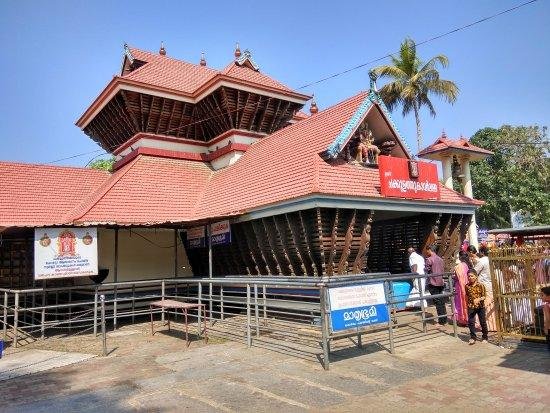Chakkulathukavu Temple, Alappuzha, Kerala
| Date built: | – |
|---|---|
| Deity: | – |
| Architectural style: | – |
| Major festivals | – |
| Locale: | – |
| District:: | Alappuzha |
| Address: | Ambalappuzha – Thiruvalla Rd, Thalavady, Kerala 688011 |
| Phone | 09447104242 |
Chakkulathu Kavu is a Hindu temple, dedicated to goddess Durga. The temple is located in Neerattupuram, Thalavady panchayat, Alappuzha District, Kerala and is one of the most popular temples in the state.
Durga is one of the most popular deities in the area. Pilgrims from all over South India visit and worship the Devi. The temple was less known even to the local residents and lay as a family temple of a local resident. This remained until it was renovated a few decades before.
Located on the banks of the holy Pampa River, this temple has attracted pilgrims all over Kerala and became one of the most popular pilgrim centre of the state.
The major festival is Pongala which takes place in the temple during the month of Vrischikam (November/December). This is the time when the glory of the Goddess is at its peak. Lakhs of women devotees gather around the temple as early as even one week before the function. The temple premises will be overcrowded and the devotees arrange places for offering the pongala on both sides of the main streets. The queue usually extends to a surprising length of 20 km. Rice, coconut and jaggery are brought by women devotees along with round earthen pots for cooking. The Chief Priest lights the main hearth from the divine fire inside the sanctum sanctorum. This fIre is exchanged from one oven to another.
Panthrandu Noyampu is another festival celebrated at the temple. This is the type of fasting and prayer that qualifies the devotee for the eternal blessings of Chakkulathamma. This fasting starts every year from the first day of the Malayalam month of Dhanu till the twelfth.
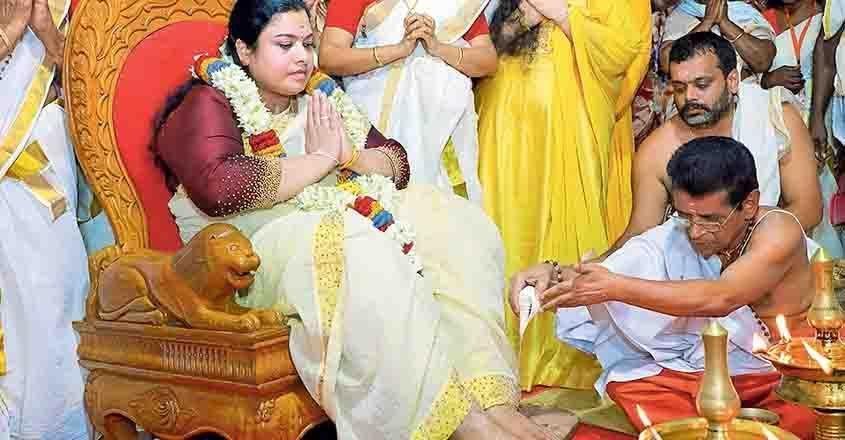
Specifically, on the first Friday of December, Dhanu is a significant ritual that sees a male priest wash the feet of fasting women devotees in a mark of respect for the divinity inherent in every woman. Celebrating womanhood, which as per the Vedas and other Hindu scriptures is the highest form of power, takes centre stage during this festival during which only women are allowed to enter the temple premises. Like the Attukal Bhagavathy temple, the Chakkulathukavu temple also celebrates the Pongala festival every year, which is also basically a women-specific celebration.
Architecture
Chakkulathamma is famously known as the Mother who answers the call of her devotees. Countless pilgrims irrespective of caste creed and colour reach the shrine. The benevolent look of Goddess unfolds a thousand lotus flowers of real bhakthi in the minds of devotees.
There is an eternal divinity which is the ultimate cause for the creation as well sustenance of this universe. As oil in sesame seeds, water in river beds and fire in friction sticks, this divinity defines all that we see and see not, all that we know and not know or all that we hear and hear not. The concept of Goddess which in way is a manifestation of Nature is the supreme symbol of this divinity that shapes us. The Devi at Chakkulatukavu temples is a benign example of the love and motherliness that Almighty showers upon any devotee who seats that inimitable Goddess in his heart.
Let us have a look at the temple history that dates back to almost 3000 years. This area where the temple stands now has been a fearful forest. Trees that seemed to touch the sky, serpents with hissing noises and wild animals in barbaric freedom created and atmosphere one would shudder to think. Rays of the sun failed to look through the trees. Afternoons were like midnights.
Into this forest came a hunter with the idea of collecting firewood. The hunter was not alone. He had his wife and children with him. But everything was so sudden and unexpected. The hunter saw a serpent moving towards him. Its hood was erect and its hissing noise was fearful. Not thinking too much the hunter attacked the snake with his axe.
But the snake was not hurt it only slipped into the forest. An expert in the habits of animals, the hunter knew too well that an attacked snake is dangerous if spared. So he followed it. Searching and searching and still he couldn’t spot out the snake. Finally he reached a lake. It was not much difficult to observe a ‘Chithalputtu’. (A cover of sand made by insects).
The hunter had a touch of horror. The next second he saw that the shell upon which the snake coiled was broken. Water was oozing out f it. The hunter watched with awe and wonder. Now there was ‘Akshatham’ (paddy and rice) and ‘Darbha’ (a peculiar type of grass used for pujas). Meanwhile the wife and kids of the hunter joined him. All were spell bound at the unbelievable sight in front of them.
Many places near the temple have derived their original names from the history of the temple. For instance, the water in the historical pond of the temple had the sweetness of jaggery. ‘Chakkarkulam’ became shortened in the long run and came to be known as Chakkulam. ‘Neeru’ in Malayalam means water. Water was absorbed into the sand shell which contained the idol. So the place around the temple came to be called as ‘Neerattupuram’. ‘Puram means place and the word denotes the place which carried and contained the holy water.
The temple was renovated in 1981. The illuminating idol of Vana Durga with the holy eight hands is installed near the original idol. Lord Shiva, Sastha, Vishnu, Vinayaka, Muruka, Yakshi, Serpent Gods and Navagrahas are installed as ‘Upa Devas’.
Legend / Local stories
The ancient history of the temple has some divine connections with the story of Sumbha and Nishumbha referred to in the Devi Mahatmyam. The story goes that two demoniac characters called Sumbha and Nishumbha derived superhuman powers through rigorous meditation of Lord Brahma. They received a boon that they could be killed only through a battle with a woman. Such a condition being almost impossible, Sumbha and Nishumbha conquered Indra and other Devas. They became the unquestioned monarchs of the three worlds. The helpless Devas under had to flee away and take shelter in remote jungles.
Saint Narada feeling pity at the misery of the Gods approaches his father Lord Brahma. Brahma reminds Narada that ups and downs are the law of life and that was what the Gods were experiencing. There was only one way out for this despicable state of affairs. Only one power could restore power and prosperity to Gods and that power was none other than the very Goddess. Devas accordingly moved in search of Goddess. Reaching near Himavan, the epic King of the mountains, they started chanting powerful mantras to appease the Goddess. They plunged into a he artful tribute of the Goddess who in herself was power, knowledge, creativity, benevolence and blessings.
Goddess Parvathy had just arrived on the banks of river Ganga. Echoes of the mantras reached her. There was a touch of grief and pleading in the sounds of Devas. Goddess Parvathy grasped the pitiable plight of Devas. There emerged another Goddess from within her as if something comes out of a cover. This was the incarnation of Goddess Durga, having taken a divine form to rescue the Devas from the hardships caused by the asuras.
The story culminates in a terrible fight between the “Goddess and Asuras under the leadership of Sumba and Nishumbha. It was an encounter unheard of ever before. Needless to specify, all the asuras were annihilated by the Goddess. The Devas got back the early powers and prosperities. Sage Narada appears in front of them and exults them about the invincibility of goddess Durga. She was the cause as well as witness for the creation, maintenance and destruction of the universe, told Narada.
It is believed that the Goddess residing in Chakkulathukavu is a wholesome reaction of this all-pervading Goddess namely Durga.
Photo Gallery
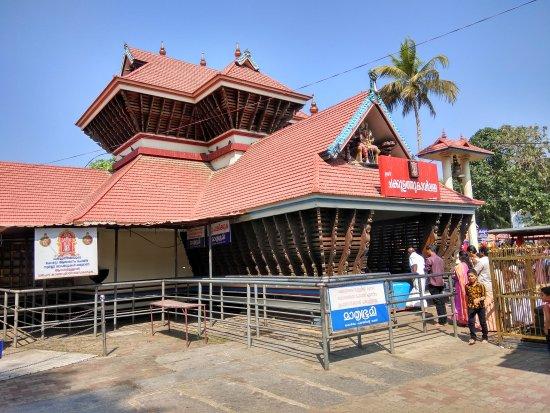
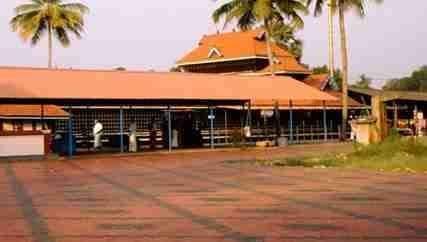

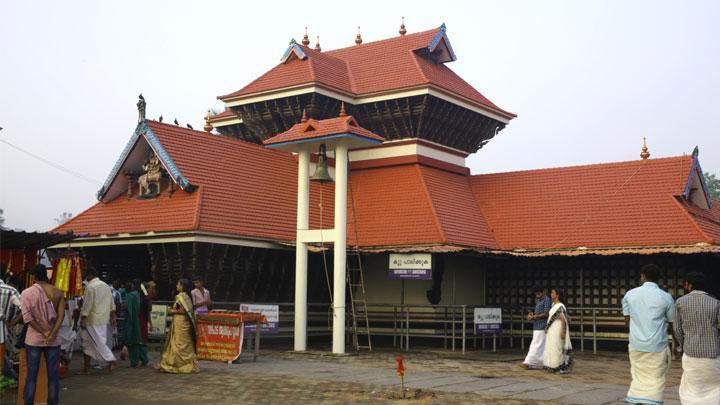
How to Reach:
Contact Details
Official Address

